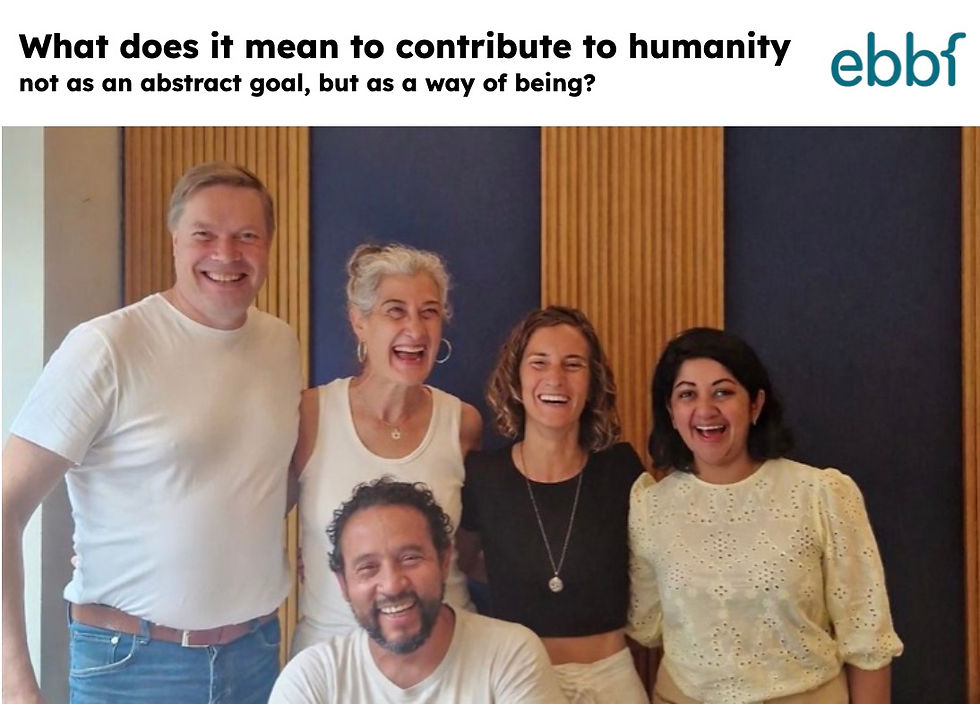#ebbfgovernance what is the impact of corruption in the fragile road of global and just governance?
- sjoerdluteyn
- Apr 30, 2018
- 4 min read
ebbf member Jean-Pierre Méan, a leading world expert on the topic of corruption and also author of ebbf’s publication “
on corruption and bribery, fighting to restore trust” recently wrote this article inspired by the theme of ebbf’s annual conference “rethinking governance to allow ethical business to build the future”.
“In the modern State, government derives its legitimacy not from a divine mission but from a delegation of powers from the people, in what has been termed a social contract. Since it is obviously not practical for all citizens, millions of them, to exercise the state power together, they choose representatives who are expected to use their power in the interest of the community. In recognition of the risk of abuse inherent in any human activity, it was felt that not all power should be entrusted to the same individual or group of individuals, but that the power should be divided in three branches of government: the legislative, the executive and the judiciary, thus creating a system of checks and balances expected to curb abuses. This in a nutshell is the essence of governance in modern democracies. These ideas were first expressed some three hundred years ago, have started to spread in the nineteenth century but have not gained a semblance of universal recognition until recently.
In order to work, good governance requires a good dose of altruism. Those in power are expected to forget their own interests in their decisions and actions. This is the Achilles’ heel of good governance. For many people, putting their interest first, egocentrism, is the natural thing to do even though they are aware that in their position of power this is unacceptable both legally and socially.
Because corruption is shameful, it is doomed to prosper in the dark. In the world of corruption, the word corruption itself is banished. Bribes are not called bribes but commissions, success fees or whatever else hides their true nature. Furthermore, in large-scale corruption, corruption related to large infrastructure projects or the exploitation of natural resources, envelopes or suitcases have practically disappeared. Payments are made through anonymous shell companies located in offshore centers, which, in the words of the NGO Global Witness, are the getaway cars for the world’s criminal and corrupt.
Large scale corruption has seen the Heads of States of too many countries using their power to enrich themselves. Those who have been the most successful in that respect have been able to divert billions of dollars for their sole benefit. Cases are known where elected officials have amassed more than 1 billion$ a year (this is more than 3 million$ a day) during their term of office while the state national debt was increasing sometimes at the same pace.
While the recipients of these huge amounts are all located in developing countries, the funds are more often than not coming from developed countries. Corporations with household names like Siemens, Alstom, British Aerospace and Alcoa are among those who had to admit that they had spent large amounts of money in bribes to obtain business.
Corruption, whether small or large, means that citizens are not getting services to which they are entitled unless they pay their way through. It is the poorest who suffer most because they cannot pay even the smallest bribe. In a maternity ward in India, the nurses were extorting bribes from young mothers to give them access to their baby. The price was 4$ for a boy, and, adding discrimination to dishonesty, 2$ for a girl.
Corruption means that the resources of entire countries are appropriated by those of have managed to get to power. A case in point is Equatorial Guinea, an oil rich country which ranks 135th on the Human Development Index of the United Nations Development Programme. In that country, a relative of the President has been able, on a salary of 5000$ a month, to accumulate a wealth of assets including a five story 4000m2 101 room building on avenue Foch, one of the most expensive in Paris, a 30million$ home in Malibu, and a Gulf Stream Jet, while 2/3 of the people of Equatorial Guinea live on less than 1$ a day.
These assets have been seized but there are many other similar cases in the world that have not been unmasked yet. However, things have begun to change. 20 years ago, it was agreed to go after international corruption and, in the last 15 years the momentum to prosecute corporate wrongdoers has built up, first in the United States, and then in other countries like Germany, the United Kingdom, Switzerland and now Brazil where the largest corrupt scheme of all times has been laid bare in what has become a national drama seemingly without end. The extent of the corruption that has been revealed had reached a point where a hidden all-encompassing network of corrupt officials and politicians were in fact controlling the workings of government under a semblance of democratic institutions.
Corruption can only prosper as long as the corrupt are able to hide the proceeds of their crime. Fortunately, prompted by the revelations of the Panama papers, efforts are underway to put an end to banking secrecy and anonymous companies. A lot remains to be done but public opinion has become aware of the absurdity of passing laws which can be evaded by creating a structure which has no other purpose than to hide the identity of its true owner so that it is not possible to connect the assets of this structure with a particular individual.
These efforts point in the right direction. However, there is no guarantee that they will be sustained. Our road to world good governance is fragile. It only reflects a way of thinking which has emerged some three hundred years ago and which has only started to be put seriously into practice in the second half of the last century. This is a very short time in the history of mankind and, today, there are alarming signs of a change of paradigm. It is an important task of civil society to make sure that these values are maintained and further developed in the coming years.”







Comments